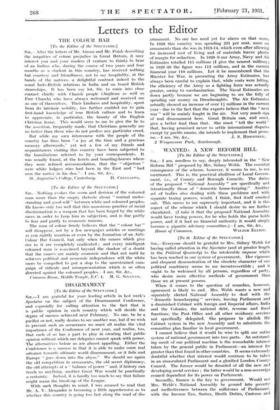DISARMAMENT [To the Editor of the SPECTATOR.]
Sin,—I am grateful for your leading article in last week's Spectator on the subject of the Disarmament Conference, and especially for calling attention to the fact that it is public opinion in each country which will decide the degree of success achieved next February. No one, be he a pacifist or not, really desires to see another war, but if we wish to prevent such an occurrence we must all realize the vital importance of the Conference of next year, and realize, too, that each of us has a part to play in creating that public opinion without which our delegates cannot speak with power. The alternatives before us are almost appalling. Either the Conference is a success in that it is able to make some real advance towards ultimate world disarmament, or it fails and Europe " goes down into the abyss." We should see again the old competition in armaments, the old secret diplomacy, the old attempts at a " balance of power " and, if history can teach us anything, another Great War would be practically a certainty. Indeed, it is hardly too much to say that failure might mean the break-up of the League. .
With such thoughts in mind, I was amused to read that Mr. A. V. Alexander is becoming a little apprehensive as to whether this country is going too fast along the road of dis-
armament. No one has need yet for alarm on that score. In 1926 this country was spending 231 per cent, more on armaments than she was in 1913-14, which even after allowing for increased cost of living and of materials leaves plenty of margin for reduction. In 1928-9 our Army, Navy and Air Estimates totalled 115 millions (I give the nearest million) ; in 1929-30 the figure was 113 millions, and in the current financial year 110 millions. Let it be remembered that the Minister for War, in presenting the Army Estimates, has always been careful to explain that, while costs were falling, the efficiency of the Army as a fighting force was actually greater, owing to mechanization. The Naval Estimates are down partly because we are beginning to see the folly of spending our money on Dreadnoughts. The Air Estimates actually showed an increase of over 1 millions in the current year—due to the fact that the experts believe that the " next war " will be mainly fought in the air. Not very much sign of real disarmament here. Great Britain can, and must, give a better lead than that. She must " tell the world that, having promised never to settle international disputes except by pacific means, she intends to implement that prom-
ise.—I am, Sir, &c., J. S. ROWNTREE. 2 Weaponness Park, Scarborough.











































 Previous page
Previous page